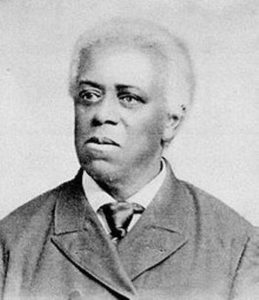
Edward Walker
*Edward Walker's birth is celebrated on this date in 1830. He was a Black artisan and attorney.
Edward Garrison Walker was the son of Eliza and David Walker, an abolitionist who wrote an appeal in 1829 calling for the end of slavery. Born in Edgefield, SC, he received training in working with leather as a young man. He established a business that eventually employed 15 people.
Walker became an abolitionist as his father had been. In 1851, he collaborated with attorney Robert Morris and activist Lewis Hayden of the Boston Vigilance Committee to gain the release of Shadrach Minkins, a fugitive slave from Virginia who had been arrested in Boston by US Marshals under the Fugitive Slave Act of 1850. The men helped Minkins hide and travel via the Underground Railroad to Canada, where he settled in Montreal. The men were "well-known Boston abolitionists" who were praised for their efforts to obtain Minkins' release. Many Boston residents resisted the 1850 Law, resenting its requirement that officials in free states support slaveholders' efforts to take back slaves.
Walker and other blacks in Boston gained integration in city schools for their children in 1855 by a state legislative act after years of lobbying in the city and at the legislature. Walker married Hannah Jane Van Vronker in 1858 in Boston. He was 28, and his bride was 23. The couple had a son named Edwin E. Walker, about 1859, and a daughter named Grace, born about 1864. The family lived with Walker's mother, Eliza Dawson. Having been inspired by Blackstone's Commentaries, which he consulted while trying to free Minkins in 1851, Walker "read the law," serving as an apprentice at the Georgetown, Massachusetts office of Charles A. Tweed and John Q. A. Griffin. He also continued to run his leatherwork business.
He became the third black lawyer in Massachusetts when he was admitted to the bar in May 1861 in Suffolk County. In 1866, Walker, representing Boston's Ward 3, and Charles Lewis Mitchell, representing Ward 6, were the first black men elected to the Massachusetts State Legislature. Both men were Republicans. Walker was nominated as a state judge by Democratic Governor Benjamin F. Butler when the Republicans held a majority in the state legislature. They voted to give the position to George Lewis Ruffin, an African American considered by the Republicans to be "loyal" to their party. Walker was nominated for judgeships three times by the governor but rejected by the Republican-dominated legislature each time.
In 1885, Walker, with wealthy restaurateur George T. Downing and other black leaders, formed the Negro Political Independence Movement. Walker was elected president of the Colored National League in 1890. He was nominated for president of the United States in 1896 by the People's Party. Walker, an independent thinker, had different ideas from many Republicans; the party did not re-nominate him as a candidate for the legislature. He joined the Democratic Party and was nominated by the Democratic governor three times to a position as a judge; the Republican-majority legislature rejected Walker each time.
In 1896, Walker was nominated as a candidate for United States President by the Negro Party. Walker died of pneumonia on January 13, 1901, in Boston. Julius Caesar Chappelle, a Black Massachusetts legislator, was among those who spoke at a memorial held for him and for ex-governor Roger Wolcott (Massachusetts) at the Kirk Literary Club, according to The Boston Herald.